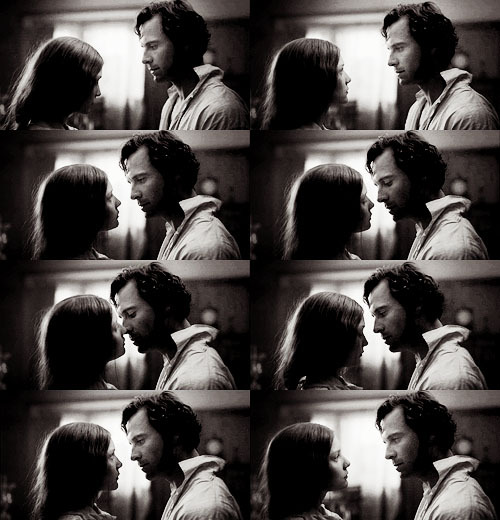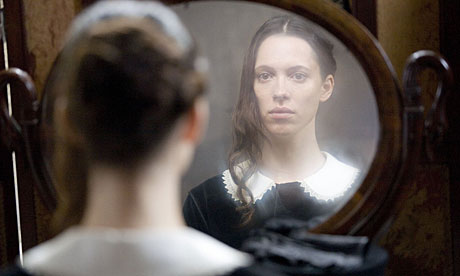picture via xsignalfirex
Finally got to see the latest Jane Eyre adaptation. Period pieces are kinda my thing, and when it just happens to be based on my favorite novel, well, it's a special occasion. But is it ever possible to be completely satisfied with an adaptation? Probably not. Unless you're the one directing it.
The only other adaptations I've seen are the 1996 Franco Zeffirelli one, the 2006 BBC one, and half of the 1983 Timothy Dalton one. I own the Orson Welles one, and I honestly don't have a good excuse for not watching it. Besides the fact that it's Orson Welles in the role of Rochester, which is just weird and creepy. ORSON WELLES.
I've read a lot of reviews of Fukunaga's version, and I pretty much agree with everything they've said, so I won't bother being long-winded about it. Basically, gorgeous cinematography and costumes, Fassbender and Wasikowska are excellent in their roles, as is the always wonderful Judi Dench, unfortunately no chemistry at all between Jane and Rochester, the flashback format was confusing and not really needed, the Lowood School scenes were cut too short, as was the revelation/explanation of the madwoman in the attic (more on this later).
Also, there were several..."awkward" moments. As someone who is herself very awkward, I have a keen eye and ear when it comes to such. And it's never more painful than when it happens on screen.
Times when I noticed it:
- The extra long scene of Adele singing in French for no apparent reason. Except perhaps for comedic effect, which never came. I smiled at Judi Dench's following line, but that's because it was Judi Dench.
- When Jane returns from visiting Mrs. Reed and meets Rochester on the bridge. He makes some funny, flirty comment. She smiles, passes him, then says still smiling "Thank you Mr. Rochester, for your kindness," or something similar and entirely too formal. Just...just a weird thing to say after the flirty informality that just occurred. Especially since she was flirty and informal previously. It was either a dialogue issue or a delivery issue. Am I insane or did anyone else notice it?
- Rochester's floaty voice when Jane is with Rivers. Destined to be awkward in any film adaptation. Floaty, whispery voices don't do well in film since it's more of a third person, omniscient medium. Works better when you're directly in the mind of the character hearing it, as in the novel. Or if it's a horror film and scary Asian cat boy is behind you whispering stuff, or something.
Despite my griping, I was happy with the outcome. A little drearier than most period dramas, and I'm glad for it. Not just a pretty film of frilly dresses and incessant British giggling (but I love those too), and no final happy wedding (or double wedding) to end it. Which is one of my favorite features of the story -- that it doesn't end with a wedding. Or begin with one. The wedding (although incomplete) is in the middle. When the novel ends, it's the future, post-marriage ("reader, I married him"). The film ends without showing even this. Just a shot of Jane and Rochester, equals as they are. (And bearded). Oh how refreshing. A grown up love story.
But back to my complaint of the short madwoman revelation. She's the most distinctive feature of the novel. The most unique, the most scandalous. Dare we forget how daring and provocative the book was when first published. The madwoman had a lot to do with that. The feminist and humanist themes, race issues, post-colonialism, class debates...they all come back to her. Yet she is usually treated as an obstacle, a metaphor -- Jane's doppelganger, a representation of her passion and anger that was locked inside while at Lowood, the desire and scourge of Rochester. But we're only given a dirty, messy-haired glimpse of her before she's thrust back into the attic. Who is/was she? Who would she be as a character in her own right?
In 1966 novelist Jean Rhys set out to answer that question, writing the Wide Sargasso Sea, a prequel to the events in Jane Eyre. I read this a few weeks back, and I've been waiting to write on it, formulating my thoughts. Really, I feel I need to read it again. It's a gorgeously-written book. There are so many themes going on, so many allusions, that even though it's a short read, it's and intense one.
In Rhys' novel, the explanation for Antoinette (Bertha) Cosway's madness is her loss of power. Marrying Rochester deprives her of her property, and the fortune she inherited. She loses her name (loses Antoinette and Cosway, gains Bertha, Mason, and Rochester) and her identity. She becomes metaphorically, and eventually literally, imprisoned in her marriage.
There are so many themes and issues -- colonialism, sexual politics, race, "otherness", allusions to the original novel -- that it would take much more than a blog post to cover it. It's amazing what she packed into such a tiny book.
So check it out, since I'm apparently speechless over here.
I will manage to include a passage though. Not completely useless today.
Everything was brightness, or dark. The walls, the blazing colours of the flowers in the garden, the nuns' habits were bright, but their veils, the Crucifix hanging from their waists, the shadow of the trees, were black. That was how it was, light and dark, sun and shadow, Heaven and Hell, for one of the nuns knew all about Hell and who does not? But another one knew about Heaven and the attributes of the blessed, of which the least is transcendent beauty. The very least. I could hardly wait for all this ecstasy and once I prayed for a long time to be dead. Then remembered that this was a sin. It's presumption or despair, I forget which, but a mortal sin. So I prayed for a long time about that too, but the thought came, so many things are sins, why? Another sin, to think that. However, happily, Sister Marie Augustine says thoughts are not sins, if they are driven away at once. You say Lord save me, I perish. I find it very comforting to know exactly what must be done. All the same, I did not pray so often after that and soon, hardly at all. I felt bolder, happier, more free. But not so safe.



No comments:
Post a Comment